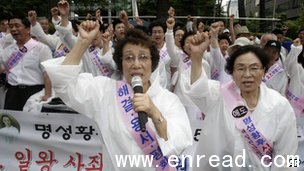日本就殖民问题向韩国致歉
Japan has offered another apology to South Korea for its war-time colonisation of the Korean peninsula.
日本已就战时朝鲜半岛殖民化问题向韩国提交了另一份致歉书。

Japan has offered several apologies but not the full compensation that some South Koreans want
It also promised to return cultural relics(文化遗产) "in the near future", including records taken by Japan of an ancient Korean royal dynasty.
The apology, though not the first, is part of Japanese efforts to forge(伪造) closer ties with South Korea.
Conservative politicians in Japan have resisted admitting Japanese atrocities(暴行,残忍) throughout World War II.
In a statement, the Japanese Prime Minister Naoto Kan expressed "deep remorse" for the annexation(合并,附加物) , 100 years ago this month.
Imperial aggression
Mr Kan expressed his "feelings of deep remorse(懊悔,同情) and heartfelt(衷心的,真诚的) apology for the tremendous damage and suffering brought by the colonial rule".
"Through the colonial rule that was against their will... the people of Korea were deprived of their nation and culture and their ethnic pride was deeply hurt," Mr Kan said.
He said Japan wants to further improve relations with South Korea, which have often been overshadowed by the countries' shared history.
The statement was issued to coincide with the centenary of Japan's annexation of the Korean peninsular, and 15 August, when South Koreans will mark their liberation in 1945.
The BBC's Roland Buerk in Tokyo says that during Japan's rule, Koreans were forced to fight on the frontline, or work as slaves or in brothels(妓院) set up by the military.
Successive Japanese prime ministers since 1995 have apologised for the country's imperial aggression.
But some conservative politicians in Japan have refused to acknowledge atrocities took place, our correspondent says.
'Unfortunate past'
In a separate gesture, Japan's Defence Minister Toshimi Kitazawa has announced that he will not be going to Tokyo's Yasukuni Shrine(靖国神社) on the anniversary of Japan's World War II defeat on Sunday.
Visits by prominent(突出的,显著的) politicians have angered Japan's neighbours in the past because convicted war criminals are among the dead symbolically enshrined(铭记,珍藏) there.
South Korea's news agency Yonhap said Seoul "positively assessed" the Tokyo statement, and "paid attention" to the pledge to return the relics(遗迹) .
A foreign ministry spokesman, Kim Yong-sam, said: "We expect all Japanese people to share this view".
"We recognize Prime Minister Kan's statement as his and the Japanese government's willingness to overcome the unfortunate past between Korea and Japan and to develop bright bilateral(双边的) relations in the future.
"We hope that through proper recognition and reflection of the unfortunate past, the close South Korea-Japan bilateral relations can further develop into a partnership for the future," Mr Kim said.